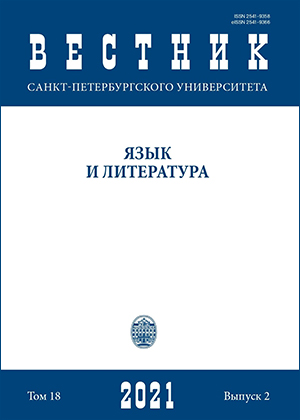Linguistic-cognitive and communicative-pragmatic features of a politician’s speech activity in a discursive position “after power”
DOI:
https://doi.org/10.21638/spbu09.2021.206Abstract
The cognitive and speech activity of the linguistic personality of a politician in the discursive position “after power” has a number of significant differences in comparison with the stages “before power” and “in power”. Its general cognitive and communicative-pragmatic character that can be described as accumulative-syncretic, adaptive and agonal, is due, firstly, to the seamless combination of substantive-thematic and speech signals of the personal and political past experiences. These experiences are projected onto the issues of the supra-individual present and included in the forecasts of the social future. These signals are present in texts generated by the politician during the post-power period. There is a subject-object “stratification” with a different balance of a subject and/or object functional status in the structure of the linguistic personality of the post-power politician. As a (proactive) subject of cognition and communication, the politician “after power” creates his/her own texts, primarily memoirs and (oral) political speeches. Becoming the object of evaluation, the politician verbally responds to them as a mental-speech subject of speech utterances in communicative situations of interviews, political discussions, public responses to articles of other politicians or comments of journalists that are close or distant to the other side of the communication. At the same time, being an object, not only with social and professional functions, but also personal qualities of the ex-politician are publicly discussed, which indicates the mandatory combination of institutional, professional and individual (third-party) assessment parameters in the structure of his/her personality.
Keywords:
linguistic personality of a politician, discursive position
Downloads
References
Гальперин 2005 — Гальперин И. Р. Текст как объект лингвистического исследования. 3-е изд. М.: Едиториал УРСС, 2005. 144 с.
Гончарова 2016 — Гончарова Е. А. Стиль как выражение релятивных и коррелятивных отношений в тексте. Вопросы филологии. 2016, 1 (53): 19–24.
Гончарова 2019a — Гончарова Е. А. Содержание и выражение диалогических отношений в интервью. В сб.: Немецкая филология в Санкт-Петербургском университете. Вып. VIII: Типология речевых жанров. Филиппов К. А., Копчук Л. Б., Григорьева Л. Н. (ред.). СПб.: Изд-во С.-Петерб. ун-та, 2019. С. 133–145.
Гончарова 2019б — Гончарова Е. А. Речевые сигналы дискурсивной открытости немецкоязычного текста Laudatio. В сб.: Немецкая филология в Санкт-Петербургском университете. Вып. IX: Диалогическое взаимодействие текстов и дискурсов. Нефедов С. Т., Езан И. Е. (ред.). СПб.: Изд- во С.-Петерб. ун-та, 2019. С. 19–36.
Шейгал 2004 — Шейгал Е. И. Семиотика политического дискурса. М.: Гнозис, 2004. 324 с.
Küsters 2005 — Küsters H. J. Die „Erinnerungen“ Konrad Adenauers. In: Bosbach F., Brechtken M. Politische Memoiren in deutscher und britischer Perspektive. Düsseldorf: Droste, 2005. S. 133–157.
Гальперин 2005 — Gal’perin I.R. Text as an object of linguistic research. 3rd ed. Moscow: Editorial URSS Publ., 2005. 144 p. (In Russian)
Гончарова 2016 — Goncharova E.A. Style as an expression of relative and correlative relations in the text. Voprosy filologii. 2016, 1 (53): 19–24. (In Russian)
Гончарова 2019a — Goncharova E.A. Content and expression of dialogical relationship in interviews. In: Nemetskaia filologiia v Sankt-Peterburgskom universitete. Vol.VIII: Tipologiia rechevykh zhanrov. Filippov K.A., Kopchuk L.B., Grigor’eva L.N. (eds). St. Petersburg: St. Petersburg University Press, 2019. P. 133–145. (In Russian)
Гончарова 2019б — Goncharova E.A. Speech signals of the discursive openness of the German text Laudatio. In: Nemetskaia filologiia v Sankt-Peterburgskom universitete. Vol.IX: Dialogicheskoe vzaimodеistvie tekstov i diskursov. Nefedov S.T., Ezan I.E. (eds). St. Petersburg: St. Petersburg University Press, 2019. P. 19–36. (In Russian)
Шейгал 2004 — Shejgal E.I. Semiotics of Political Discourse. Moscow: Gnozis Publ., 2004. 324 p. (In Russian)
Küsters 2005 — Küsters H.J. Die „Erinnerungen“ Konrad Adenauers. In: Bosbach F., Brechtken M. Politische Memoiren in deutscher und britischer Perspektive. Düsseldorf: Droste, 2005. P. 133–157.
Downloads
Published
How to Cite
Issue
Section
License
Articles of "Vestnik of Saint Petersburg University. Language and Literature" are open access distributed under the terms of the License Agreement with Saint Petersburg State University, which permits to the authors unrestricted distribution and self-archiving free of charge.






